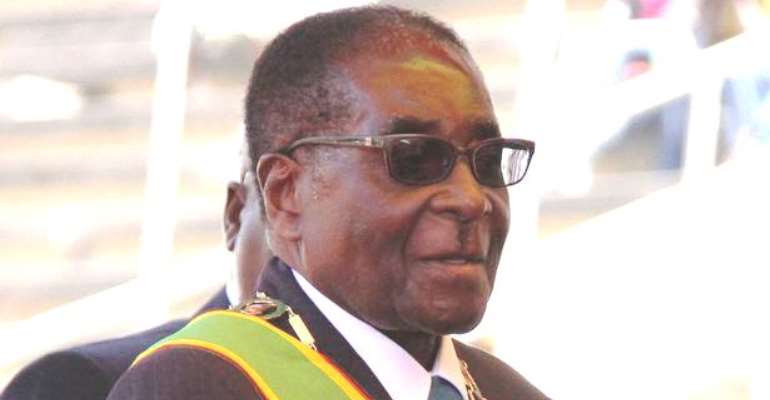Dear Prof. Bukenya, Comrade Mugabe Was Not a Megalomaniac

I read with pleasure the debates published by the Saturday Nation on whether the late Robert Mugabe was a villain or a hero. The most interesting contribution to the debate was the story by Prof. Austin Bukenya published in the Saturday Nation on 14th September 2019.In the story Professor Bukenya was on the side which argued that Mugabe was a villain, in fact Bukenya dismissed Mugabe as a political villain that suffered from megalomania just like Idi Amin Dada and Mummar Gaddafi.Bukenya borrowed an example from literature to diagonize Mugabe as a grandiose person that suffered from madness of self-over estimation just like Don Quixote a key character in Cervantes’s long novel Don Quixote. However, this was only an over-statement. Mugabe was not a quixotic megalomaniac. Instead he was a political realist. He only suffered from weaknesses that all revolutionary and liberation politicians have always suffered. Not forgetting the fact all those African politicians that opposed the west were put on the economic sanctions so that there can be economic justifications for demonizing them.
If Mugabe had been a victim of megalomania the way Bukenya put it, then he would not have managed to unite the Tshona and the Ndebele tribes into united guerrilla army to fight colonialism out of Zimbabwe. Megalomaniac are usually so weak; they cannot withstand the pressure that goes with leading a guerrilla army. A better description of the character and leadership prowess of comrade Mugabe can be read in Kwame Nkrumah’s last book the Rhodesia File. And I am sure Bukenya have not liked reading it, it is revolutionary and anti-royalist, but professors Bukenya’s political ideology as well as political conscience has been evidently Royalist, this can be deciphered out in the drama, poetry, short stories and long prose works by Bukenya.
I agree with those criticizing Mugabe over land problem in Zimbabwe, but one must realize the fact that the purpose of all the armed struggles in Zimbabwe was all about repossessing lands that had been stolen by white men through colonial machinery. If Mugabe had not taken land from the European settlers, then it would have been betrayal to the black freedom fighters who went to the bush to fight for restoration of land. And also it was so illogical in practical politics for white Europeans to be settler ranch holding farmers, when Africans are land poor in their own country.
Prof. Bukenya missed the point by pointing out Gaddafi and Idi Amin as psychological failures that stole their way into world politics. No. For one to fight imperialism he or she must have special intellectual disposition, fighting for African freedom from European colonizers was not a cosmetic affaire, it was not walk in the park, it needed some special breed of madness. Just like Frantz Fanon observed in the Wretched of the Earth, colonialism was institutional violence that dug its own grave in form of counter-violence that accompanied armed struggle for freedom. Thus, Mugabe’s political psychology was just an after-shock of being a victim of prolonged colonial violence.
Political research has always shown that gentility and good manners will never give you power, but instead, just as Nicollo Machiavelli observed in the Prince, the more brute the prince, the more effective he becomes. Thus, those brutal characters in the likes of Gaddafi, Idi Amin, Mugabe, Milton Obote and so forth had brutality of behavior as their first capital in their business of adventure in the world of power politics. Professor Bukenya only missed to remember Mao Tse Tung’s argument that freedom and political power is earned through the barrel of the gun, a fact which finely tunes in with Thomas Hobbes’ philosophy of power as Nasty, violent and brutish. But more serious is when Professor Bukenya misunderstood Cervantes by being tempted by the opening chapters of Don Quixote to distaste the Knight errantly of Don Quixote as the main lesson on which we can base our justification to dismiss Don Quixote as victim of blind grandeur. No, Bukenya goofed.
Cervantes’s Don Quixote is book that worships those who take dangerous adventures in an effort to get power. In the book Cervantes comes up with two concepts; quoxitification of the sancho Pancha and Panchification of Don Quixote. To quixotify Sancho Pancha is to try to give to a coward and gentle person some political power, it is so impossible, cowards never rule, instead they will run away to leave power for the brutally brave. This is what happened in the book, Sancho Pancha the gentle, coward and slavish squire was given an island to rule as a king, he only ruled for ten days and ran away by only imagining that the armed people are coming to attack him. But the brutal and self-over estimated Don Quixote struggled against sorts of deadly dangers until he finished his life with a crown on his head. Hence, an argument that power is often attracted by the victims of grandeur like Mugabe and other megalomaniacs, but the dovish gentlemen will never rule.
Alexander Opicho writes from-Lodwar, Kenya [email protected]
